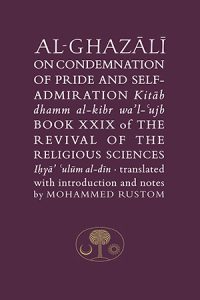Al-Ghazali on Condemnation of Pride and Self-Admiration (Ihya Ulumuddin Series No. 29)

Author: Imām Al-Ghazali
Translator: Mohammed Rustom
Publisher: Islamic Texts Society
Year of Publication: 2018
Print Length: 227 pages
Genre: Islamic Studies / Quranic Studies; Theology, Ethics and Philosophy; Science, Reflection & Self-Development; Qur’anic Reflection, Supplication & Prayers; Non-Fiction / Religious Studies
Topic: Prophet Muhammad ﷺ, Islam, Qur’an, Human Nature & Character, Human Psyche, Islamic Psyche, Ethics & Morality, Spirituality
The Condemnation of Pride and Self-Admiration is the twenty-ninth chapter of The Revival of the Religious Sciences, a monumental work of classical Islam written by the theologian-mystic Abu Hamid Muhammad al-Ghazali. Perhaps the most important chapter in the whole of Revival, The Condemnation of Pride and Self-Admiration delves into the fundamental spiritual ailments and major impediments of the soul, namely pride and self-admiration.
In Part One, Ghazali focuses on pride, firstly by showing how the Qur’an condemns it, then by demonstrating what pride is and what its symptoms are, how pride manifests outwardly, as well as the seven causes of pride, the root cause being self-admiration. In seeking ways to cure the soul of pride, Ghazali presents the virtue of humility as the spiritual virtue par excellence; he offers examples of true humility, of false humility, and the manner by which the seven causes of pride can be uprooted. In Part Two, Ghazali hones in on the root cause of pride: self-admiration. As with pride, Ghazali defines self-admiration, shows the various ways it manifests inwardly, how it causes negligence, delusion and complacency, how each of these can be remedied.
Just as humility is recognised as the virtue par excellence, pride is recognised as the vice par excellence; and this by all religions. The Condemnation of Pride and Self-Admiration is therefore a genuine contribution to the field of virtue ethics and will be of interest to all those engaged in the religious and spiritual life.
Table of Contents
Al-Ghazāli’s Introduction to the Revival of the Religious Sciences
Citations and Abbreviations
Preface & Acknowledgments
Introduction
THE BOOK OF THE CONDEMNATION OF PRIDE AND SELF-ADMIRATION
Prologue
Part 1: On Pride
1. The Condemnation of Pride
2. The Condemnation of Ostentation and the Display of the Traces of Pride in One’s Gait, and in the Dragging of One’s Garments
3. The Virtue of Humility
4. The Reality of Pride and Its Defect
5. The Objects of Pride, their Degrees and Categories and the Consequences of Pride Towards Them
6. Reasons for Pride
7. The Causes of Pride and the Means that Provoke It
8. The Character Traits of the Humble and the Effects of Humility and Pride
9. The Method for Treating Pride and Acquiring Humility
10. The Objective in Practicing Humility
Part 2: On Self-Admiration
1. The Condemnation of Self-Admiration and its Defect
2. The Defect of Self-Admiration
3. The Reality of Self-Admiration and Presumptuousness, and their Definitions
4. Treating Self-Admiration in General
5. Types of Causes for Self-Admiration and How to Treat Them
Notes
Appendix: Persons Cited in the Text
Bibliography
Index to Qur’ānic Quotations
General Index

Imām Abu Hamid al-Ghazali is a 11th century Muslim scholar. He was one of the most prominent and influential philosophers, theologians, jurists, and mystics of Sunni Islam. Al-Ghazālī was born at Ṭūs (near Mashhad in eastern Iran) and was educated there, then in Jorjān, and finally at Nishapur (Neyshābūr), where his teacher was al-Juwaynī, who earned the title of imām al-ḥaramayn (the imam of the two sacred cities of Mecca and Medina). He was active at a time when Sunni theology had just passed through its consolidation and entered a period of intense challenges from Shiite Ismâ’îlite theology and the Arabic tradition of Aristotelian philosophy (falsafa). Al-Ghazâlî understood the importance of falsafa and developed a complex response that rejected and condemned some of its teachings, while it also allowed him to accept and apply others. His great work, Iḥyāʾ ʿulūm al-dīn or Ihya Ulumuddin (“The Revival of the Religious Sciences”), made Sufism (Islamic mysticism) an acceptable part of orthodox Islam.
Source: https://plato.stanford.edu/entries/al-ghazali/
More from Imam al-Ghazali in this library, click here.

Mohammed Rustom is Associate Professor of Islamic Studies at Carleton University. He is the author of the award-winning book The Triumph of Mercy: Philosophy and Scripture in Mulla Sadra (2012) and co-editor of The Study Quran: A New Translation and Commentary (2015).
Source: https://its.org.uk/catalogue/al-ghazali-on-the-condemnation-of-pride-and-self-admiration/
More from Mohammed Rustom in this library, click here.
